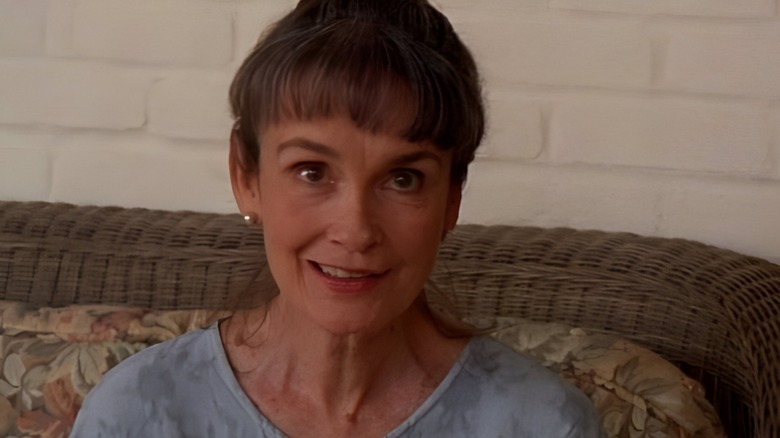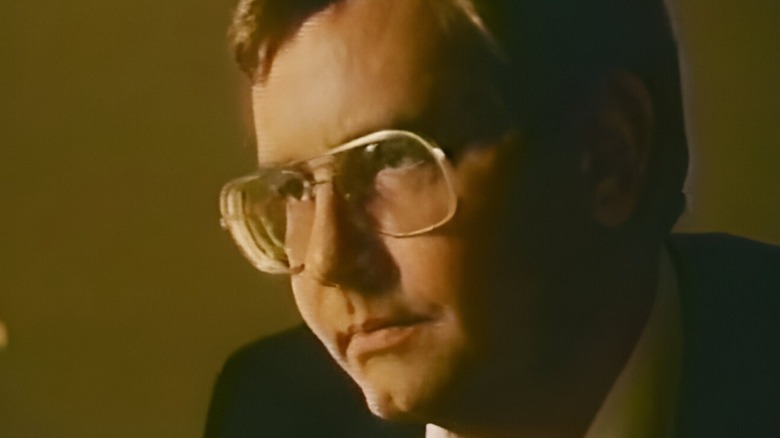The Shawshank Redemption's Director Made Another Stephen King Adaptation Early In His Career
Few directors appreciate and understand Stephen King's vision like Frank Darabont. This appreciation can be traced all the way back to the 1994 box office bomb turned beloved classic "The Shawshank Redemption," in which Darabont imbues an earnest prison drama with gripping dramatic stakes. It might be tempting to categorize a film like "Shawshank" as melodramatic, but this sentimental excess is so sincerely crafted that you will find genuine depth in the evolving narrative. After all, it's one of King's more optimistic non-horror stories, as everything boils down to the beauty of human ingenuity and our innate ability to grow in spite of external resistance.
Five years later, Darabont approached "The Green Mile" through a similar lens, earning it mainstream success and four Academy Award nominations. But Darabont's true potential as a director adept at bringing King's stories to life was revealed with "The Mist," which somehow manages to be more gut-wrenching than its vivid source material. There's also more to "The Mist" than the unexpected downer ending that makes it heartbreakingly bleak (though the story is better for it!), as Darabont's interpretation of the film's themes remains refreshingly honest through and through. Even outside of making banger Stephen King adaptations, Darabont has proven himself to be a competent horror screenwriter, having contributed to genre titles like "The Blob" and "A Nightmare on Elm Street 3: Dream Warriors."
Darabont's fascination with King's oeuvre, however, preceded "Shawshank," as the director also helmed a short film based on one of King's short stories in 1983. This story was "The Woman in the Room," which was a part of King's 1978 short story collection "Night Shift" (which also includes brilliant tales like "Children of the Corn" and "The Lawnmower Man", so be sure to check it out if you haven't already). So, let's talk about "The Woman in the Room."
Darabont's Woman in the Room is as intensely melancholic as King's short story
The core of King's "The Woman in the Room" is grief-fueled remorse. The story unfolds from the perspective of Johnny, a man who's forced to watch his terminally ill mother gradually waste away. After spending endless hours near her hospital bed and seeing her deal with immense pain, Johnny makes the difficult decision to end her suffering. However, this unimaginable burden weighs heavily on his soul. It's a painful, melancholic story about loss, where any impulse to prevent further suffering of a loved one is counteracted by the horror inherent in the act (and the guilt that comes with it).
Darabont was in his early 20s when he read this moving short story in King's "Night Shift" collection, after which he sent the author a letter seeking permission to adapt it. After getting King's approval, Darabont lovingly crafted a slow-burn version that ends with a chilling dream sequence, highlighting his gift for making a mark through unforgettable imagery. When we see Johnny (Michael Cornelison) try to use one of his clients at the law firm to better understand what it's like to kill someone, the more subtle aspects of his ethical dilemma are made clear in the most heartbreaking ways. Now, if you watch "The Woman in the Room" today, its limitations as a shoestring budget student film might be fairly glaring. All the same, Darabont's artistry as a filmmaker still shines through, as a lot is achieved in just 30 minutes.
It's clear that Darabont simply gets King's impulses as a storyteller, and this is best understood in this statement he once made about the latter's greater love for the human condition and its many virtues and flaws alike (via Far Out Magazine):
"Stephen is a very old-fashioned storyteller, in the best sense of being old-fashioned. King loves people; you can see it in his writing. He loves their nobility and their foibles; he loves the ways in which they can excel and the ways in which they can crumble and fall ... He is an analyst of the human soul, if you will, as all the best storytellers are."
Right on. If you like Darabont's filmmaking, then his "The Woman in the Room" is a must-see, as it provides a solid glimpse into the bold creative voice he is today.

